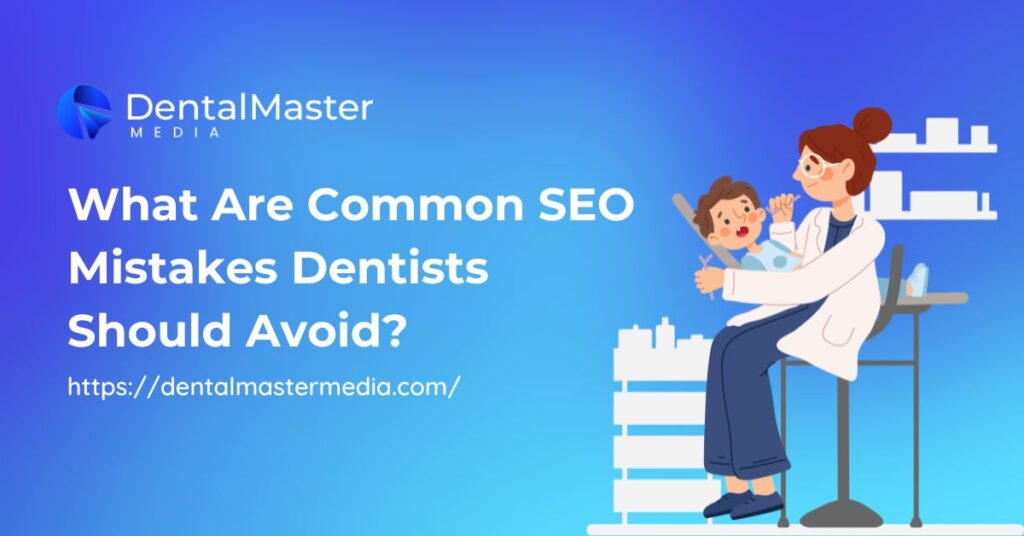Imagine you’ve spent time, money, and energy creating a sleek and professional dental website—your logo stands out, your colours are modern, and the design flows beautifully. But no one is visiting it.
That’s not just frustrating—it’s a problem. A well-designed website that doesn’t appear in search results might as well be invisible. This is where Search Engine Optimisation (SEO) steps in.
SEO helps dental clinics show up on Google when someone searches for services like “toothache relief near me” or “best dentist in [your city].”
But many dentists unknowingly make small mistakes that prevent their website from ranking well.
This article breaks down the most common SEO slip-ups and how to fix them, so your clinic can be found by the right people at the right time.
Not Claiming or Optimising Your Google Business Profile
Why It Matters
Your Google Business Profile (formerly known as Google My Business) plays a key role in local SEO. When people search for a nearby dentist, this profile is often the first thing they see on the results page—complete with your location, hours, reviews, and phone number.
It’s a vital piece of your online presence and one that SEO Experts for Dentists always recommend setting up and managing properly to boost visibility in local searches.
Common Mistake
Many dentists forget to claim this profile or leave it half-complete. They don’t upload photos, update business hours, or respond to reviews.
These missed steps signal to Google—and potential patients—that the business may not be active. A well-maintained profile helps build trust and gets your clinic in front of people looking for dental care nearby.
Using the Wrong Keywords (or None at All)
How Keywords Work
Keywords are the search terms people type into Google when they’re looking for something. For dental clinics, this could be anything from “kids’ dentist” to “teeth whitening in Newcastle.”
Including these words naturally on your website helps Google match your pages with what people are searching for.
What Dentists Often Get Wrong
Many clinics fill their pages with clinical or technical terms that patients don’t actually search for—like “periodontal scaling” instead of “deep cleaning for gums.” Others forget to include important local words, like the name of the suburb or city.
To make the most of Seo For Dentist, focus on using simple, real-world phrases your patients would use.
Thin or Duplicate Content
Why Google Dislikes It
Google wants to show helpful and original websites to its users. If your site has very short pages with little useful information—or copies content from other sites—Google may push your website lower in the rankings.
What You Should Do Instead
Each of your services should have its own page. For example, separate pages for root canals, braces, veneers, and emergency dental care.
Explain what the treatment is, who it helps, and what the process is like. And always write in your own words—don’t copy and paste from competitors or manufacturers.
Ignoring Mobile-Friendliness and Speed
Why Mobile Matters
Today, most people search for services on their phones. If your website isn’t mobile-friendly—meaning it doesn’t look or work right on smaller screens—visitors will leave quickly. Also, if your site loads slowly, it creates a bad first impression and can hurt your rankings.
Simple Fixes
Start by using a responsive website design that adjusts to different screen sizes. Compress your images so they don’t slow things down.
Avoid cluttered layouts or features that require heavy loading, like background videos. These small improvements help both users and search engines.
Forgetting About Title Tags and Meta Descriptions
The Role They Play in SEO
Title tags and meta descriptions are what show up on Google’s search page. Think of them like mini-ads for your web pages. A good title and description help searchers decide whether to click your link or scroll past it.
Mistakes to Avoid
Many dental websites either leave these blank or reuse the same text on every page. This confuses Google and can lower your rankings. Instead, each page should have a unique title and description that clearly tells people what that page is about.
Not Having a Clear Site Structure
Why Structure Is Key
Your website should be easy to use—for both people and search engines. A clear structure helps visitors find what they’re looking for quickly. It also helps Google understand your site and index it correctly.
Mistake Example
Sometimes, dentists hide important pages deep in dropdown menus or forget to link between related pages.
For example, a service page about dental implants should link to the pricing page or FAQs about the procedure. Without these links, users might get stuck or confused—and Google might too.
Neglecting Local SEO Opportunities
What Local SEO Means for Dentists
Local Dental SEO focuses on helping people in your area find your clinic. This includes being listed in online directories, local news sites, or community boards. These mentions help Google verify your location and credibility.

Where Dentists Go Wrong
One common mistake is not being listed in local directories like Yelp, Hotfrog, or HealthShare.
Another is having mismatched or inconsistent information—such as a different phone number on your website than on your Facebook page. These small errors can cause Google to lose trust in your information.
No Strategy for Reviews or Testimonials
The Power of Positive Feedback
Reviews help people feel confident about choosing your clinic. They also signal to Google that your business is active and trusted. Having lots of positive, recent reviews can boost both your click-through rates and your rankings.
What’s Missing
Some dentists forget to ask patients for reviews—or never respond to the ones they receive.
Thanking people for their kind words or replying professionally to a negative review shows potential patients that you care. Don’t miss this easy chance to improve both trust and SEO.
Ignoring Analytics and Tracking
Why Data Matters
You wouldn’t treat a dental problem without an X-ray or exam. Similarly, you shouldn’t make changes to your website without knowing what’s working. Tools like Google Analytics and Google Search Console give you clear insights.
Missed Opportunities
Without these tools, you won’t know which pages people visit most, how long they stay, or whether they’re clicking your phone number.
You also miss chances to spot technical issues—like broken links or slow pages—that might be hurting your SEO.
Not Working with Dental SEO Experts
Why DIY Isn’t Always Enough
You may be able to fix a leaky tap at home, but you wouldn’t try to install an entire dental chair on your own.
The same idea applies to SEO. While you can handle the basics, professional help often leads to better, faster results.
Smart Help
A trusted team like Dental Master Media understands how to grow dental websites the right way.
From keyword research and content creation to technical audits and backlink strategies, professionals know how to avoid common traps and stay ahead of Google’s updates.
When you want to go beyond the basics, working with experts makes a noticeable difference—especially for long-term success with Seo For Dentist.
Conclusion
A beautiful dental website means nothing if no one sees it. SEO helps bring the right visitors to your site, but common mistakes—like ignoring local listings, using poor keywords, or having a confusing layout—can hold you back.
Fortunately, these mistakes are easy to fix once you know what to look for. By updating your content, improving your local presence, and making your site more user-friendly, you’ll be in a stronger position to attract new patients and grow your practice online. Good SEO takes ongoing effort, but even small steps can bring big results.

Suraj Rana is the owner of Dental Master Media and a leading expert in SEO for dental practices. With a passion for dental marketing, he has successfully helped numerous dental clinics climb the search engine ranks. Suraj’s expertise makes him a go-to resource for effective, results-driven dental marketing.

